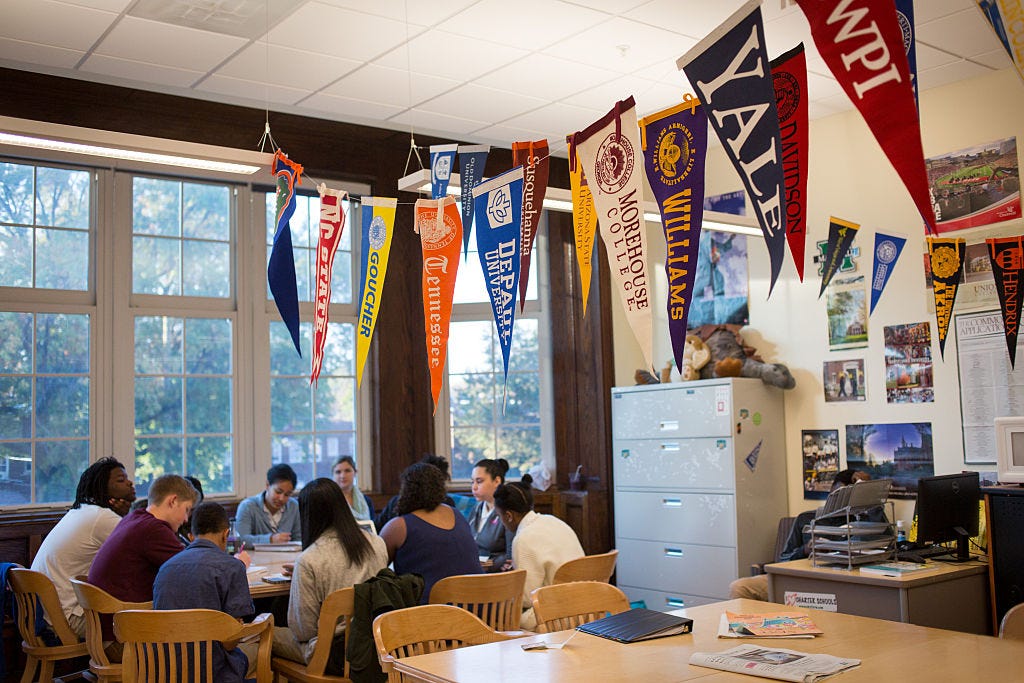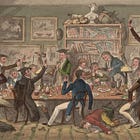A Pedagogy of the Empowered
The left-wing cancellations of yesteryear teach us how to respond to the right-wing censorship of today.
This piece is part of a series, generously made possible by the support of the Arthur Vining Davis Foundations, on pluralism and dialogue in education.
In 2020, Steven Wilson, former education adviser to the governor of Massachusetts, was condemned as racist and fired from his job for writing an essay on the educational philosophy underlying the network of charter schools he founded. Here’s my favorite line from that essay: “every student can experience the satisfactions of their intellect … the heady delight in connecting ideas, the pleasure of the imagination, and the reward that follows mental struggle.”
That should be the rallying cry and anchoring conviction of every educator.
There are indeed racist educational philosophies out there. One such philosophy is that poor minority kids cannot achieve at the same level as rich white kids, a view neatly summed up in the George W. Bush line, “the soft bigotry of low expectations.” Another is believing that only white people or Europeans have contributed books worth reading, philosophies worth discussing, or art worth viewing.
Steven Wilson was guilty of neither. The almost entirely poor minority students in his 15 Ascend charter schools were reading Baldwin and Shakespeare, and appreciating paintings from Jacob Lawrence to the Dutch Masters. Furthermore, they were scoring higher than their white peers at public schools on standardized tests and going to selective colleges.
What exactly did Wilson do wrong? According to The New York Times, some younger staff at the Ascend schools considered his essay “racially traumatizing,” likely because it directly criticized the progressive educator Tema Okun’s profoundly destructive idea—as expressed in her popular 1999 workbook on “Dismantling racism”—that linear thinking, objectivity and respect for good writing are features of “white supremacy culture.”
A petition was circulated denouncing Wilson and his “white supremacist rhetoric,” and Wilson was fired. The Times reported that the board who fired him was almost entirely white. Indeed, the lone black member of the board resigned in protest at that decision.
It is a revealing detail. Study after study demonstrates that white liberals are far more likely than minorities to view political and social issues through a racial lens. As Matt Yglesias documented in his seminal 2019 essay, “The Great Awokening,” it is white liberals who say in surveys that African Americans and Latinos require “special favors” to get ahead, not African Americans and Latinos.
Indeed, in a conversation I had with Wilson, he wryly noted that while he knew many rich white funders and young progressive teachers who wanted to make antiracism the center of the curriculum, he has never met a black parent at a charter school who said “please increase the amount of antiracist programming” or “I want you to teach my child to reject white oppressor knowledge.” In fact, Wilson contended, these are not just profoundly damaging educational theories—they amount to spiritual and moral violations. Education should focus on nurturing students’ potential, not indoctrinating them into a worldview that requires them to believe they are victims.
Wilson has now written a compelling book, The Lost Decade, on how to build excellent schools where learning is revered and students from all backgrounds thrive. He demonstrates how the antiracist and social justice pedagogies that were in vogue over the last ten years have contributed to a nosedive in student achievement in once excellent charter school networks. In one network, scores rated as “meeting or exceeding” standards on the SAT math section plummeted from 41% of the 2017 class to 4% of the 2024 class (although Covid likely also played a role).
For me, it felt queasily familiar. For the last ten years, I’ve listened to one of my best friends from high school tell me horror stories of what happened to the high quality charter school he taught at from 2015 to 2024. He was recruited away from a fancy private institution where he was teaching Advanced Placement classes to the city’s richest kids with the inspiring invitation to teach the same curriculum to the city’s poorest students in an expertly managed school.
At first the school was exactly as promised, well-run and high achieving, and my friend was proud to be part of the enterprise. But in 2020, the school did an about face and uncritically embraced the most extreme form of antiracism. Disaster ensued. One story was particularly hair-raising. Staff were told—by the person in charge of student conduct, no less—that normal discipline, from reprimands to detentions, amounted to nothing more than white control over black and brown bodies. After a brawl involving several students took place in the hallways, the teaching staff held a meeting to discuss how to respond. Many were silent for fear of being called white oppressors if they proposed reasonable consequences for physical violence. Consequently, the perpetrators of the fight were not adequately disciplined. Proper order declined further. Over the course of the next month, several teachers quietly handed in their resignations and left before the school year ended.
When an environment suffocates responsible discussion, like how to hold students accountable after a brawl, then, out of self-preservation, people will make irresponsible choices, like abandoning their students before the school year ends.
In his book, Wilson locates the root cause of the problems that hit charter schools over the last ten years in an interesting place—the lack of viewpoint diversity on college campuses. “Aspiring teachers today have increasingly limited exposure in their own education to a pluralist pedagogy where they encounter competing views,” he writes. “As K–12 teachers, this leaves them ill-prepared, if not disinclined, both to develop unit plans that invite students to grapple with diverse viewpoints and to encourage spirited classroom discussion. Writing a lesson that indoctrinates students in one claim is easy—but stultifying for children.”
Wilson’s insight underscores the foundational role that higher education plays in our civil society. When universities are healthy, our civil society tends to be healthy. Andrew Sullivan saw this particular sickness coming in his prescient 2018 essay “We All Live On Campus Now.” The thesis was simple: the punitive left-wing orthodoxy that governed campuses in the 2010s would soon find its way into the sectors (media, education, nonprofits) most likely to hire those graduates. Yascha Mounk referred to this as the “short march through the institutions.”
Why speak about the saga of Steven Wilson in 2025? After all, we are living in an era of industrial scale, right-wing, state-sponsored cancellations without due process. That is how I see the termination of already-awarded government grants, the detentions of Palestinian student activists, and the deportations of people like Andry Hernández Romero. Every American should be alarmed, and progressives are right to lead the fight. Important institutions are being gutted, and lives are being destroyed.
But where were these voices when people like Steven Wilson were being cancelled? Or Junot Diaz, or Jeanine Cummins, or Carole Hooven?
The fact is, in the institutions that progressives run—universities, social service agencies, literary magazines, philanthropic foundations, art galleries, museums, advocacy organizations, charter schools, newspapers—a self-appointed vanguard mercilessly canceled literally thousands of their colleagues, thus undermining the purpose of those institutions and tanking public confidence in the social sector more broadly. These people hoped to be Nat Turner while behaving like Maximilien Robespierre, and most of us said nothing.
I do not think it is a distraction to speak of such matters now. In fact, I think it is imperative. Do you think that the public is unaware of the way progressives hollowed out their own institutions and shivved their own friends over the last ten years? Do you think this has nothing to do with the political situation we find ourselves in today?
If we are to have any credibility whatsoever in criticizing the grotesque state-sponsored censorship currently taking place—and if people are ever going to trust progressives to lead again, whether in elected office or university administration—we are going to have to do a proper public accounting of how we soiled our own sector over the last decade. What the authoritarians in Washington are currently doing grieves me, but it does not surprise me. The Joker is supposed to burn down the city.
But in all of the ugly chaos, I see signs of hope.
Alan Garber, the president of Harvard University, is both leading the fight against the authoritarian takeover of civil society and publicly admitting Harvard’s own failures in allowing a toxic oppressor/oppressed ideology to poison the culture of the institution. Dr. Garber understands the score: institutions like Harvard will either be reformed by change agents who love them, or destroyed by change agents who hate them.
Meanwhile, Steven Wilson, who is incidentally a Harvard graduate from a much different era, is not wallowing in his own cancellation saga, nor seeking revenge on the people who took his head. Instead, he has co-founded a new civic institution, the National Summer School Initiative, whose purpose is to elevate the lives of the poorest children through excellent education.
This is American civil society in the early stages of renewal. These are the flickering candles that light the way forward in a time of darkness.
Eboo Patel is the founder of Interfaith America and the author of We Need to Build: Field Notes For Diverse Democracy. He served as an advisor on faith to President Barack Obama.
Follow Persuasion on X, LinkedIn, and YouTube to keep up with our latest articles, podcasts, and events, as well as updates from excellent writers across our network.
And, to receive pieces like this in your inbox and support our work, subscribe below:







A great and memorable line: “institutions like Harvard will either be reformed by change agents who love them, or destroyed by change agents who hate them.”
While the heavy-handed focus on racism took over, social class was ignored.